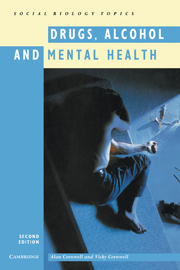Book contents
- Frontmatter
- Contents
- Preface
- 1 Drugs and drug abuse
- 2 Socially acceptable drugs
- 3 Misuse of prescribed and related drugs
- 4 Hallucinogenic drugs
- 5 Opiates and other narcotics
- 6 The biology of alcohol
- 7 The problems of alcohol use
- 8 Prevention and control of alcohol problems
- 9 Help for problem drinkers
- 10 Mental health and mental illness
- 11 Alzheimer's disease and other dementias
- 12 Other mental illnesses
- Further reading
- Index
10 - Mental health and mental illness
Published online by Cambridge University Press: 05 June 2012
- Frontmatter
- Contents
- Preface
- 1 Drugs and drug abuse
- 2 Socially acceptable drugs
- 3 Misuse of prescribed and related drugs
- 4 Hallucinogenic drugs
- 5 Opiates and other narcotics
- 6 The biology of alcohol
- 7 The problems of alcohol use
- 8 Prevention and control of alcohol problems
- 9 Help for problem drinkers
- 10 Mental health and mental illness
- 11 Alzheimer's disease and other dementias
- 12 Other mental illnesses
- Further reading
- Index
Summary
Introduction
Mental health is defined in terms of behaviour and personality which fit in with the norms of the society in which one lives. If one is mentally healthy one can live successfully amongst one's fellows and function effectively both economically and socially. It follows that any definition of mental health will depend on the norms of the particular society. In some societies the concept of mental illness may not exist: people whom we would consider to be mentally ill may be revered as soothsayers, shamans and witch-doctors. Here, we consider those who have visual or auditory hallucinations, or who go into periods of withdrawal from society, or who become excessively elated, to be mentally ill, but elsewhere they are the seers into the future and determine the societal policies and actions. For the purposes of this book, mental illness will be considered in relation to Western society and the forms of mental illness recognised in Great Britain will be discussed.
Thus the general definition of mental illness to be used is that form of illness which presents mainly psychological symptoms and/or disturbances of behaviour which are incompatible with normal social functioning.
Historical review
Mental illness seems to have existed throughout the documentation of human history, with a fascinating progression in the ways in which it has been recorded. Biblical and other ancient documents contain many references to madness or mental illness, usually in terms of possession by devils or evil spirits. In fact this is a concept of mental illness which remained in common usage until quite modern times.
- Type
- Chapter
- Information
- Drugs, Alcohol and Mental Health , pp. 80 - 85Publisher: Cambridge University PressPrint publication year: 1993



